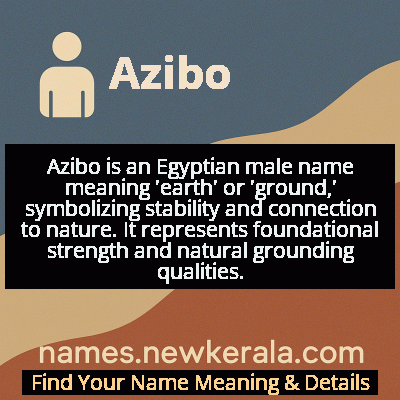Azibo Name Meaning & Details
Origin, Popularity, Numerology Analysis & Name Meaning of Azibo
Discover the origin, meaning, and cultural significance of the name AZIBO. Delve into its historical roots and explore the lasting impact it has had on communities and traditions.
Name
Azibo
Gender
Male
Origin
Egyptian
Lucky Number
8
Meaning of the Name - Azibo
Azibo is an Egyptian male name meaning 'earth' or 'ground,' symbolizing stability and connection to nature. It represents foundational strength and natural grounding qualities.
Azibo - Complete Numerology Analysis
Your Numerology Number
Based on Pythagorean Numerology System
Ruling Planet
Saturn
Positive Nature
Ambitious, efficient, realistic, and authoritative.
Negative Traits
Materialistic, stressed, confrontational, and can be overly ambitious.
Lucky Colours
Dark blue, black.
Lucky Days
Saturday.
Lucky Stones
Blue sapphire, amethyst.
Harmony Numbers
2, 4, 6.
Best Suited Professions
Business leaders, managers, financial services, law enforcement.
What People Like About You
Leadership, determination, organizational skills.
Famous People Named Azibo
Azibo Athletes
Ancient Egyptian Architect
Designed royal tombs and temples in Thebes, known for innovative structural engineering
Azibo Nkosi
Contemporary Artist
Internationally recognized for blending ancient Egyptian motifs with modern African art forms
Azibo Mensah
Environmental Scientist
Pioneered sustainable agricultural techniques inspired by ancient Egyptian farming methods
Name Variations & International Equivalents
Click on blue names to explore their detailed meanings. Gray names with will be available soon.
Cultural & Historical Significance
The name was often given to children born during planting seasons or to families with strong ties to land ownership, serving as a reminder of their dependence on and reverence for the natural world that sustained their society. This cultural context positioned Azibo as more than just a personal identifier - it was a statement about one's relationship with the fundamental elements of existence and a connection to the agricultural rhythms that governed Egyptian life for millennia.
Extended Personality Analysis
Individuals named Azibo are typically perceived as grounded, reliable, and deeply connected to their roots. They exhibit a strong sense of stability and practicality, often serving as the foundation in their relationships and communities. Their earth-associated nature makes them patient, methodical thinkers who prefer building lasting structures rather than seeking temporary solutions. Azibos tend to be protective of those they care about, displaying a nurturing quality similar to the earth's ability to sustain life.
This grounding influence often makes Azibos excellent in crisis situations, where their calm demeanor and practical approach provide much-needed stability. They typically value tradition and continuity, seeing themselves as links in a chain connecting past, present, and future. While sometimes perceived as resistant to change, this quality actually reflects their commitment to ensuring that progress is built on solid foundations. Their strength lies not in flashy displays but in consistent, reliable presence - much like the earth itself, which supports all life without seeking recognition.
Modern Usage & Popularity
In contemporary times, Azibo has experienced a resurgence particularly among families seeking names with African roots and natural meanings. While not among the most popular names globally, it has gained traction in African diaspora communities and among parents interested in ancient Egyptian heritage. The name appears more frequently in artistic and academic circles, often chosen by parents who value cultural significance over trendiness. Its usage remains relatively rare, making it distinctive without being unfamiliar. Recent years have seen increased interest in nature-based names, which has contributed to Azibo's gradual emergence from obscurity while maintaining its unique character. The name is most commonly found in North America, Western Europe, and urban centers across Africa, where it serves as both a cultural anchor and a statement of pride in ancient African civilizations.
Symbolic & Spiritual Meanings
Symbolically, Azibo represents the foundational aspects of existence - stability, growth, and nourishment. Like the earth itself, the name embodies the concept of being grounded while simultaneously possessing the potential for creation and sustenance. It symbolizes the interface between the physical and spiritual realms, serving as the solid ground from which aspirations can grow and the final resting place to which all things return. The earth symbolism extends to concepts of heritage, tradition, and connection to ancestors, representing the accumulated wisdom of generations. Azibo also carries metaphorical meanings of resilience - the earth's ability to withstand seasons of hardship and still produce abundance, making it a symbol of enduring strength and regenerative power that transcends individual lifetimes and connects to cyclical patterns of nature.

